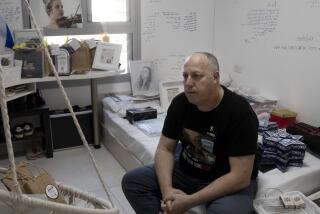A Wide-Ranging Trek Through the Book of Exodus
- Share via
The opening passage of “The Particulars of Rapture” offers a working definition of “Midrash,” a Hebrew term that is used in Rabbinic writings to describe “the interpretive study of the Bible.” With becoming modesty, the book’s author, Avivah Gottlieb Zornberg, offers the definition to help us understand the sources that she consulted in writing this study of the Book of Exodus, the collections of Midrashic writings by the great rabbis and sages of antiquity and the Middle Ages.
But the fact is that “The Particulars of Rapture” is Midrash, and it is Midrash of a very high order. She honors the free-associative and sometimes even phantasmagoric style of classic rabbinical Midrash--a form of exegesis that is often expressed in the telling of tales that elaborate upon the biblical text with rich invention--but she also brings the tools of the psychologist and the literary critic to bear upon the ancient texts.
“Adopting the psychoanalytic model, I suggest that the peshat, or plain meaning of the text, functions as the conscious layer of meaning,” Zornberg explains, “while the Midrashic stories and exegeses intimate unconscious layers, encrypted traces of more complex meaning.”
The psychoanalytic model is an especially apt one because Zornberg wants us to see both the conscious and the unconscious meanings of the Book of Exodus, the “public, overt, triumphal narrative of redemption” that we are taught in sermons and Bible study classes but also the “multiple, contradictory, unofficial narratives which, like the unconscious, undercut, destabilize the public narrative.”
Whenever Zornberg considers a familiar incident that we remember from Sunday school or Hebrew school--the Golden Calf, the Ten Plagues and so on--she invites us to plumb the theological and psychological depths of the text. Thus, for example, the crossing of the Red Sea is the occasion for musings on, among other things, the harshness of divine justice, the birth imagery in the parting of the waters, the singing of songs as an expression of narcissism and the “power of desire” and the celebratory dance of Miriam and the women of Israel as “a kabbalistic image for equality.”
Zornberg, whose earlier work includes “The Beginning of Desire,” a study of the Book of Genesis, has read deeply in the biblical text itself and, if anything, even more deeply in the classical sources of rabbinical commentary. But she is clearly intent on using the Western canon to illuminate the Torah, and so her cross-references include not only such medieval Jewish sages as Rashi and Ramban but also Nietzsche and Kierkegaard and Wittgenstein, William Blake and William Wordsworth and Wallace Stevens.
Indeed, Zornberg is capable of conjuring up T.S. Eliot, Rashi, Jeremiah and A.A. Milne in a single breathtaking passage that ponders the mental state of the enslaved and despairing Israelites in Egypt when God--previously “apathetic, un-seeing, un-hearing, un-knowing”--suddenly reveals himself to Moses and announces: “I have seen the affliction of My people in Egypt.” And, significantly, she borrows a term from psychiatry when she presents the Israelites as suffering from a deadened spirit that distances them from God.
“God here predicts that their response will be a kind of autism,” writes Zornberg. “They will simply continue walking in the wake of their own thoughts, sunk into the old structures, like Winnie-the-Pooh pursuing the fabulous Heffalump round and round the same tree.”
Zornberg does not bother with the nagging questions that have occurred to other authors who have recently pondered the life of Moses and the saga of the Exodus, such as Amy Dockser Marcus in “The View From Nebo” or Israel Finkelstein and Neil Asher Silberman in “The Bible Unearthed.” Was Moses a flesh-and-blood human being or purely a figure of myth and legend? Did any of the events of the Exodus really happen the way they are described in the Bible? Indeed, did they happen at all? Such notions simply do not interest Zornberg.
“ ‘What really happened in Egypt?,’ ” she writes, “becomes a less important question than ‘How best to tell the story?’ ”
The best way to tell the story, according to the Midrashic tradition that Zornberg embraces, is not the simple and stately narrative that we find in the Bible. Rather, each of the biblical stories is re-imagined and retold in an earnest effort to find new and deeper meanings in the old texts. For exactly that reason, “The Particulars of Rapture” offers an approach to the Bible that is both challenging and enriching.
*
Jonathan Kirsch is a contributing writer to the Book Review and the author of, most recently, “King David: The Real Life of the Man Who Ruled Israel,” “Moses: A Life” and “The Harlot By the Side of the Road: Forbidden Tales of the Bible.”
More to Read
Sign up for our Book Club newsletter
Get the latest news, events and more from the Los Angeles Times Book Club, and help us get L.A. reading and talking.
You may occasionally receive promotional content from the Los Angeles Times.








